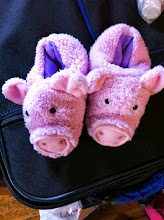The place. The place where history will either be made, or broken, was buried so deeply in the most obscure part of the multi-billion dollar sprawling medical complex that it had taken me a good ten minutes of wandering around, asking various people where the Surgical Endocrinology Lab was and THEY even not having a clue. Employees, who've worked on that floor for years.
I entered, peeling off my jacket as the warm air hit various body parts,instantly making it feel like a sauna, despite the coolness of the outside air. Ginny liked her haven on the warmer side of things.
It appeared much like the setup of the other research lab, recliners,racks of tubes, tables, several people running the lab tests and a short-white-coated-incredibly-young-looking medical student helping out. It's truly scary that there are now doctors younger then I..and that most people my age are now residents. Ack-I am old.(when did that happen?) Signed papers, had IV put in, drank 2 cans of chocolate Boost, and watched the CGM drift up from 114.
Research doctor wandered in. Ironically, his last name was the same as the research doc down in Virginia. I swear I can't get away from that last name, its too weird how it worked out. Another 2 people came in, they were pre-pancreatic (perhaps a Whipple?)surgery. They drank the Boost/glucose tolerance thing but of course they weren't getting the hormone. Research doc patiently answered all my questions,and asked a bunch of me(to make sure I passed the "should be in" test). Their drug is actually made in the lab and has had no effects in either rats, or humans.(and they make it in their lab so its not from some animal) There will be 4 visits, 4 weeks apart. (2 this week, 2 4 weeks from now)
Visit #1
-100 carbs of Boost
-IV blood draw every 15 minutes for 3 hours
-Get hitched up to study pump that contains either placebo saline or the pancreotic polypeptide.

Said pump, is a Disetronic T10 Panomat insulin pump probably from the 1980's, it is dirt-old and HUGE. Twice the size of my little Ping. They use this pump, because its the only pump out there that can deliver pre-programmed boluses and not have a basal rate. My job, is to do absolutely nothing at all. Do not press any of the buttons, check out the various screens, or drop it in the toilet. It also isn't waterproof, nor does the set detach, so I have to put it in a little baggie and hang it around my neck while showering.(and swimming for 3 days=OUT). I feel like I'm back in the dark ages.
-get payed for first visit($50)
-Recheck bg, (530) correct blood sugar
-Get Meal Voucher, wander on down to cafeteria where everything looks incredibly unappealing and I spend most of it on diet drinks because I'm that thirsty.
(pump return on Friday)
I really think I got the placebo this go-around, the research doc said I likely wouldn't be able to tell the difference but bgs have stayed their normal wackiness(perhaps from getting strep again,who knows,3rd time in 3 months,I'm a strep magnet) so either I'm not getting Wonder Drug or being sick is just minimizing the positive effects. Who knows. Next time I would get the real thing, if I got the placebo this time. Wonder Drug is supposed to make the highs not so high and the lows non-existent. Also got to meet the researcher who has been doing this for the past 20 years,that was pretty neat,drug company sponsorship might actually happen.
That evening, went to pump club, the guest speaker was an ophthalmologist from JH.(one of the members asked her doc to be the guest speaker) JH docs tend to think they are the cream of the crop and other places are 2nd rate or don't even deserve mention. I happen to think the place I got my eye care was pretty great(and cutting-edge) too, so the attitude of said doctor annoyed me a bit. He took our questions/talked about all things eyes for two hours.
Some points he made:
-new treatments are in the works, but lasars are the sole means of treating retinopathy and the lasers of today are very much more precise then those of 20 years ago.
-smoking ups your risk of macular degeneration by 400%. Besides upping glaucoma and retinopathy.
-Teenagers are walking into his office with severe proliferative retinopathy, and most going blind. Freaky scary.
-the goals isn't a cure, its to give you another 40 years with minimal damage. D is going to inflict damage, no two ways about it, the goal should be to limit that damage. He then looked around the table, demonstrating his point by saying that X,X,X you have eye disease, kidney disease, nerve damage(for the record, he gave me till age 84. I was ecstatic,84 sounds pretty good in my book,my a1cs are not longevity material). Apparently we're all disasters, waiting to happen. It was bothering, because thinking of yourself as half-dead and just waiting for the other half to fall apart as well is not really how one should be approaching life.
-young people who have cataract surgery are much more likely to need a lasar-capsulotomy to clear up hazing but I got lucky.
-sunglasses are really not that benifical in terms of reducing UV damage, they did a study on Bay crabbers (those who wore sunglasses vs those who didn't) and damage was the same.
-eyeballs actually shrink when the retina has detached(I'm not sure if this means they get smaller in the socket?)
(at that point, my own eyes were probably as round as saucers-freaky piece of info)
Bottom line is, there's no Plan B for blindness.(when they've done all they can do) You've got to do everything in your power to keep your body, and your eyes, healthy.





2 comments:
While that sounds pretty miserable (the HUGE pump, on a bag for showering, high BG's), it is exciting to think what the research might lead to. Thank you for your participation Heidi!
That eye stuff is scary. Very scary.
The placebo effect has been defined as an event. Placebo is a substance that does not have known clinical effects.
Post a Comment